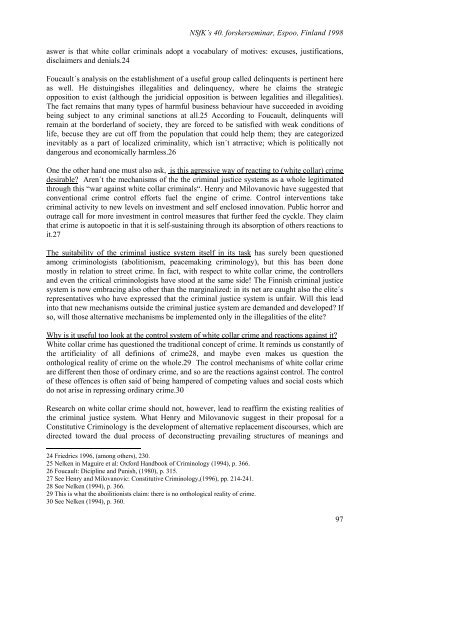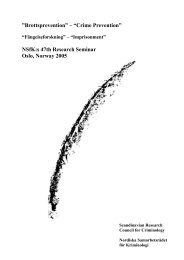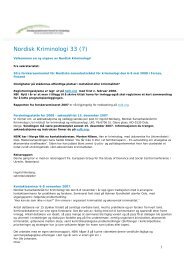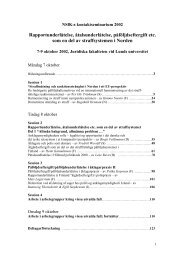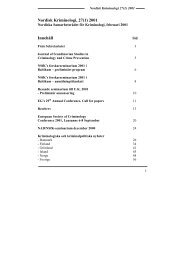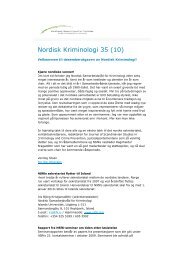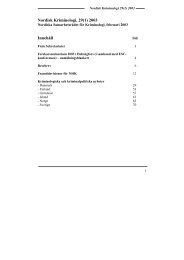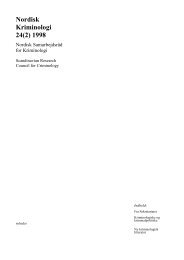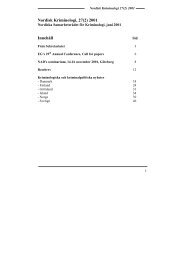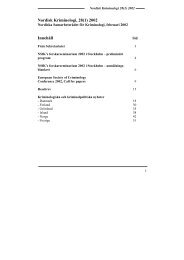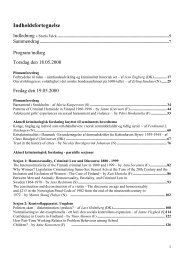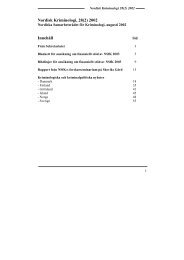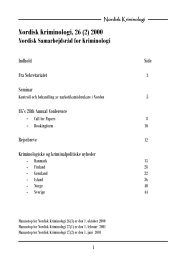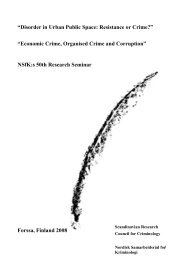Organised Crime & Crime Prevention - what works? - Scandinavian ...
Organised Crime & Crime Prevention - what works? - Scandinavian ...
Organised Crime & Crime Prevention - what works? - Scandinavian ...
Create successful ePaper yourself
Turn your PDF publications into a flip-book with our unique Google optimized e-Paper software.
NSfK’s 40. forskerseminar, Espoo, Finland 1998<br />
aswer is that white collar criminals adopt a vocabulary of motives: excuses, justifications,<br />
disclaimers and denials.24<br />
Foucault´s analysis on the establishment of a useful group called delinquents is pertinent here<br />
as well. He distuingishes illegalities and delinquency, where he claims the strategic<br />
opposition to exist (although the juridicial opposition is between legalities and illegalities).<br />
The fact remains that many types of harmful business behaviour have succeeded in avoiding<br />
being subject to any criminal sanctions at all.25 According to Foucault, delinquents will<br />
remain at the borderland of society, they are forced to be satisfied with weak conditions of<br />
life, becuse they are cut off from the population that could help them; they are categorized<br />
inevitably as a part of localized criminality, which isn´t atrractive; which is politically not<br />
dangerous and economically harmless.26<br />
One the other hand one must also ask, is this agressive way of reacting to (white collar) crime<br />
desirable? Aren´t the mechanisms of the the criminal justice systems as a whole legitimated<br />
through this “war against white collar criminals“. Henry and Milovanovic have suggested that<br />
conventional crime control efforts fuel the engine of crime. Control interventions take<br />
criminal activity to new levels on investment and self enclosed innovation. Public horror and<br />
outrage call for more investment in control measures that further feed the cyckle. They claim<br />
that crime is autopoetic in that it is self-sustaining through its absorption of others reactions to<br />
it.27<br />
The suitability of the criminal justice system itself in its task has surely been questioned<br />
among criminologists (abolitionism, peacemaking criminology), but this has been done<br />
mostly in relation to street crime. In fact, with respect to white collar crime, the controllers<br />
and even the critical criminologists have stood at the same side! The Finnish criminal justice<br />
system is now embracing also other than the marginalized: in its net are caught also the elite´s<br />
representatives who have expressed that the criminal justice system is unfair. Will this lead<br />
into that new mechanisms outside the criminal justice system are demanded and developed? If<br />
so, will those alternative mechanisms be implemented only in the illegalities of the elite?<br />
Why is it useful too look at the control system of white collar crime and reactions against it?<br />
White collar crime has questioned the traditional concept of crime. It reminds us constantly of<br />
the artificiality of all definions of crime28, and maybe even makes us question the<br />
onthological reality of crime on the whole.29 The control mechanisms of white collar crime<br />
are different then those of ordinary crime, and so are the reactions against control. The control<br />
of these offences is often said of being hampered of competing values and social costs which<br />
do not arise in repressing ordinary crime.30<br />
Research on white collar crime should not, however, lead to reaffirm the existing realities of<br />
the criminal justice system. What Henry and Milovanovic suggest in their proposal for a<br />
Constitutive Criminology is the development of alternative replacement discourses, which are<br />
directed toward the dual process of deconstructing prevailing structures of meanings and<br />
24 Friedrics 1996, (among others), 230.<br />
25 Nelken in Maguire et al: Oxford Handbook of Criminology (1994), p. 366.<br />
26 Foucault: Dicipline and Punish, (1980), p. 315.<br />
27 See Henry and Milovanovic: Constitutive Criminology,(1996), pp. 214-241.<br />
28 See Nelken (1994), p. 366.<br />
29 This is <strong>what</strong> the aboilitionists claim: there is no onthological reality of crime.<br />
30 See Nelken (1994), p. 360.<br />
97


